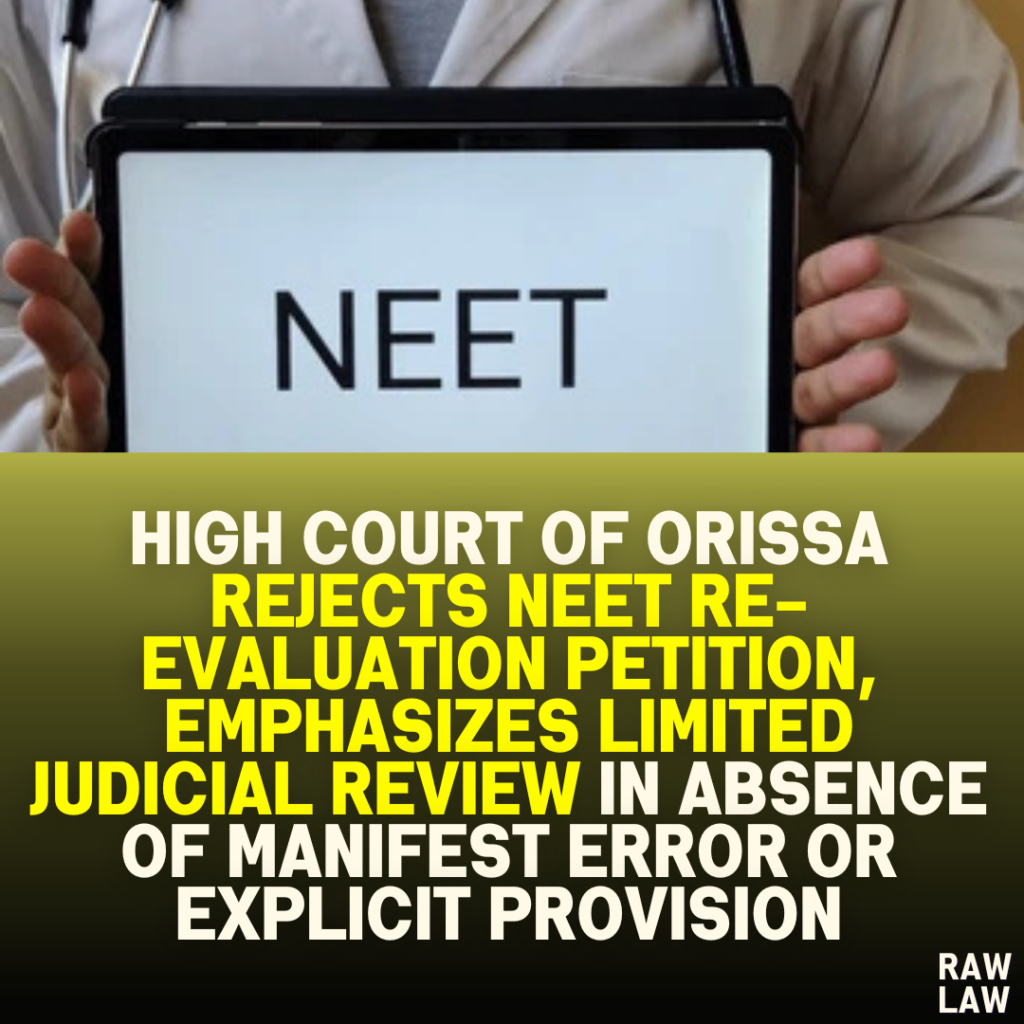Court’s Decision:
The High Court of Orissa dismissed the petitioner’s writ request for re-evaluation of his NEET (UG) 2024 answer sheet, emphasizing that in cases where examination rules explicitly preclude re-evaluation, courts lack the grounds for intervention unless rare and exceptional circumstances are evident. The court held that the petitioner could not demand re-evaluation under Article 226 of the Constitution, as the Information Bulletin for NEET 2024 clearly prohibits re-checking or re-evaluation of answer sheets.
Facts:
The petitioner, who appeared for NEET (UG) 2024, received a revised All India Rank (AIR) after a re-test for certain candidates, which improved his score. However, he contended that his score in Physics was incorrect due to improper evaluation, arguing that he should have received higher marks. Specifically, the petitioner believed his answers in Physics (Section B) were incorrectly evaluated due to a mark mistakenly registered on question Q. No.148, which he did not intend to attempt. He claimed this error affected the calculation of his total score.
Issues:
The primary issue was whether the petitioner was entitled to re-evaluation of his NEET answer sheet despite a clear stipulation against it in the NEET 2024 Information Bulletin.
Petitioner’s Arguments:
The petitioner argued that his marks were miscalculated in Physics due to an inadvertent mark against Q. No.148, which he attributed to a thumb impression error during the exam. He maintained that this mistake unfairly impacted his score and requested re-evaluation.
Respondent’s Arguments:
The National Testing Agency (NTA) argued that, as stipulated in Clause 14.4 of the NEET 2024 Information Bulletin, re-evaluation was not allowed. Citing Supreme Court precedents, the NTA asserted that judicial intervention was unwarranted in such cases where re-evaluation rules were absent, emphasizing that the OMR sheets are evaluated through impartial, machine-grade software without human interference.
Analysis of the Law:
The court reviewed the established legal framework surrounding re-evaluation requests in the absence of explicit statutory provisions, considering precedents such as Ran Vijay Singh v. State of Uttar Pradesh, which affirms that courts should refrain from intervening in the absence of statutory rights to re-evaluation. The court highlighted the rationale in Pramod Kumar Srivastava v. Chairman, BPSC, where the Supreme Court ruled that unless provided by law, candidates have no inherent right to demand re-evaluation.
Precedent Analysis:
The court cited key precedents including Himachal Pradesh Public Service Commission v. Mukesh Thakur and Central Board of Secondary Education v. Khushboo Shrivastava, reinforcing that courts generally should not order re-evaluation unless there exists a manifest error that is clear and demonstrable without inferential reasoning. The court noted that the petitioner’s situation did not meet these stringent criteria.
Court’s Reasoning:
The court reasoned that NEET’s grading system and OMR evaluation method are explicitly designed to minimize human error and prevent the need for re-evaluation. The petitioner’s claim hinged on an unintentional mark, which the court deemed insufficient to override the established rule against re-evaluation. The court emphasized that judicial review under Article 226 is constrained in such academic matters, barring cases of manifest error.
Conclusion:
The High Court concluded that there was no compelling basis to interfere with the NTA’s evaluation. The petitioner’s circumstances did not qualify as rare or exceptional, as required by established legal standards, to justify court-ordered re-evaluation.
Implications:
This decision underscores the judiciary’s reluctance to interfere in academic evaluations where rules explicitly preclude re-evaluation. It reinforces the principle that courts will not assume the role of an examining body unless there is a clear case of manifest error devoid of subjective interpretation.




Pingback: Gauhati High Court Permits CBI to Obtain Voice Samples in High-Profile Bribery Case, Citing Economic Impact of Corruption and Overriding Privacy Concerns - Raw Law